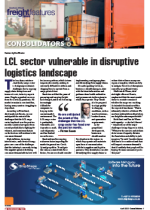Neutral consolidator SACO CFR has announced that it will be implementing new direct services in a bid to improve its service offerings and better support its customers' needs. The move comes as part of the company's ongoing commitment to innovation and customer service excellence. According to trade manager Kreeson Moodley, the benefits of new direct services are many, including reduced cost, transit time, and the reduced risk of damage that comes with additional handling when a transhipment hub is involved. “Now, more than ever, logistics service providers need to remain f luid with service offerings as market demands shift. This extends to aligning with increased or decreased carrier capabilities, new carrier service chains, or opening new offices in territories to extend our neutral network.” This has been demonstrated by the company's weekly direct service offering from Fos-sur-Mer, France to Durban, which has proven to be a viable solution for customers with cargo originating south of Lyon in France, reducing high transport costs to move cargo via Le Havre. In response to growing demand from the Far East, SACO CFR has also introduced its weekly direct service from Singapore Gateway to Port Elizabeth, providing customers with a direct solution that meets their needs. In addition to implementing new direct services, the company has revisited and innovated existing service offerings in response to changing market conditions. For example, carriers have recently changed their port rotation, resulting in increased lead times for cargo coming out of Europe into Cape Town. In response, SACO CFR changed its direct service from London Gateway, United Kingdom, to Cape Town, to now route over its London Gateway to Port Elizabeth service instead. This move has allowed the company to significantly reduce transit times for customers, thanks to its efficient regular IDM (Inter Depot Movement) service from Port Elizabeth to Cape Town. According to Nicholas Von Flemming, national sales manager, the value comes through economies of scale and having the ability to run multiple trucks weekly. This is the same logic as running multiple consols on ocean from the same port too. While there had been a decrease in the LCL market, with volumes falling below prior years, there had been a shift in the dynamics of the freight market, he said. At the same time, carriers' freight pricing had been softening globally over the past months. “Our freight forwarder partners report that their clients are prepared to sacrifice performance for price until it goes wrong with a cheap option, then premium service becomes relevant once again,” he said

